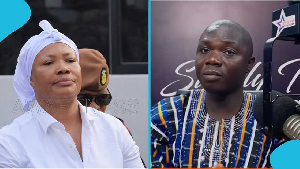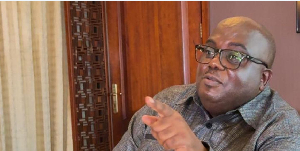It was early morning on Saturday 4th February 2012 when I found myself commuting from my home in Stratford, the venue of the Olympics, to the Wembley training arena in north London to attend the first training session as Games Maker to work as a volunteer at the Olympic Games in the summer. As I woke up on the cold early February morning, my memories went back to my Middle School days at Bomfa Achiase in Ashanti Akim. During that time, my step mother woke me and my half brother up about 5.00am most days in the week to harvest corn from the farm about a quarter of a mile away. On our return home, she cooked the corn and I carried it in a large pan or bowl across the length and breadth of the town to sell. After that, I returned home to get ready for start of school at 8.00am. On other days that I did not sell corn, I pounded fufu in my step mother’s sokora or chop bar before getting ready for school. This time round, it was hard getting up that day in February, but I said to myself it should not be new to me. It was part of the tradition I inherited from my parents and taught to me by my teachers.
The Wembley arena where I attended the training session was an eye opener. The number of people who attended the session was massive. So was the auditorium where the session was held. It was a fantastic atmosphere.
The evening which I spent on the other side of north London was even more enlightening. The fourth of February 1965, forty-seven years ago, was the day when Dr Joseph Boakye Tweretwie Danquah, the Doyen of Ghana Politics, passed away at Kwame Nkrumah’s medium security prison in Nsawam. To mark this sad occasion on Ghana’s calendar, the Communications and Research Departments of NPP UK and Ireland organised a symposium at the Dominion Centre, Wood Green, also in north London. If there is one person as a public figure, dead or alive, that I hold in the highest esteem, it is no other than Dr J B Danquah. I like him because he was both learned and loved his tradition. Therefore, I was most pleased to be at the symposium. Thus, on the fourth of February, I witnessed in the morning an advanced world dominated by sophisticated technology and showbiz. What happened in the evening was a contrast and manifested my tradition as I looked back to my past starting from Gold Coast through to Ghana.
At the time we entered the hall at the Dominion Centre, the ground was dry, although the weatherman had forecast snowfall. At the end of the symposium as we walked towards the exit door, nature had magnificently manifested itself. The ground, the top of cars parked on the street and the roof of low rise houses had turned into white. The ground was covered in a heap of snow, and it was still falling. Vehicles were driven at a snail’s pace because of the ice.
Inside the hall at the Dominion Centre, Richard Dombo Diedong, son of the late Chief S D Dombo, was the first speaker at the symposium. He was able to capture our attention from a good speech which he eloquently delivered. He quoted from a compilation by H K Acheampong to remind us of what Dr Danquah said at the inaugural meeting of the United Gold Coast Convention (UGCC) in the 1940s: “We have come to take a decision whether our country and people are any longer to tolerate a system of government under which … those who are in control of government are not under the control of those who are governed.”
Richard Diedong said Dr Danquah strove to bridge the divide that the colonial administration tried to create between the intelligentsia and the Fante chiefs. Further, through his persistence and persuasion, the Asantehene and the Asanteman Council eventually agreed in favour of a single legislative council as opposed to two bodies proposed by the colonial government, thereby defeating the divide and rule tactics of that government.
He went on to state as follows: “Dr Danquah, though of the intelligentsia and for that matter elite class, was very respectful of traditional values, to wit, the institution of chieftaincy. In a fundamental way, chiefs, he reflected, represented the mass of the people they preside over. Therefore, to Dr Danquah, recognizing the role of chiefs, and including them in any modern government of Gold Coast and an independent country, would be a demonstration of grass root democracy – government of the people and by the people, as represented by the chiefs. Therefore, Danquah was unshakeable in his pursuit of making the institution of chieftaincy an integral part of any future governance of the country. He was unwavering in his insistence that any form of legislature for the country must have a special place for the chiefs. Thus he advocated for a two chamber legislature, otherwise known as a bi-cameral legislature for the country.”
The symposium got even more enlightening as a goodwill message was read from Nana Addo Dankwa Akufo-Addo, the 2012 flagbearer, who had taken his listening tour to Houston, Texas, at the time. It was read to us in London by the Chairman of NPP UK and Ireland, Hayford Atta-Krufi. Nana Akufo-Addo reminded us that it was Dr Danquah’s academic enquiries that convinced the rest of our founding fathers to adopt the ancient name Ghana for our independent nation in 1957. He was the publisher of the first daily newspaper in Ghana, the Times of West Africa.
Nana Akufo-Addo said in his message that “Danquah and his associates took exception to sections of our population being called ‘veranda’ (boys and girls). They insisted that every citizen of Ghana is a royal in his or her own right and that they were entitled to a good home, a decent meal, a good education and a good job. Danquah, in 1928, described every Ghanaian citizen as an ‘odehye’ – a royal of the land of his or her birth. Born free, to live free.”
Nana Akufo-Addo concluded the message with the following beautiful quote from this great man: “I do not myself mind suffering so long as it is not suffering for myself. To suffer for oneself is the emptiest of all suffering; to suffer for others is the greatest spiritual elevation.”
Dr Danquah was a great man. He was more than aware that, before the Portuguese arrived on the shores of the then Gold Coast, our ancestors acknowledged the existence of man’s creator, the Almighty, the Omnipotent. Dr Danquah lived in London himself and must have marvelled at how the land that was dry in the morning could turn into snow white in the evening. Of course, he lived through many such wonders but of a different nature in the then Gold Coast.
Dr Danquah acknowledged the recognition and reverence that our ancestors gave to our creator, Otweaduampon Nyame, in his literary work, The Akan Doctrine of God. He wanted this belief to continue and sustained through our customs, practices and constitution.
I have already referred to the sophisticated telecommunication system that magnificently amplified the Wembley training arena on the morning of 4th February 2012. I contrast this with the heavy snow that fell in the evening and children playing snowball on the streets. It brought back to me memories of my childhood and the tradition in which I grew up. My parents taught me catch words like “Suffer to gain” which meant hard work every minute of my life. There was discipline and respect for authority. We as children followed our parents’ example to show respect for the Odikro, i.e. the head or chief of the village.
In my childhood, I walked long distances to fetch water from the river each morning. I walked long distances to the farm, to school, and to accompany my mother from village to village visiting relatives. When I grew up, walking became part of my life and I enjoy it. I love to leave the car at home and take the bus to work. It amazes me when organisations like Living Streets in London annually offer incentives such as free lunch to persuade people to leave their car at home and walk to work as a form of exercise. When I was a child, my parents taught me to hate waste. It became part of my life as I grew up, and I find it interesting that governments have adopted elaborate policies to recycle materials and avoid waste to halt climate change.
“The good old days” are words that recur in my mind. Hard work, discipline and respect for authority were important factors that made life good and fulfilling. I remember being taught in my childhood that “Although it is one person who gives birth to bring a child into the world, it is the community that brings the child up.” The chief was the leader of the community. He still is, although respect for him has eroded. Nonetheless, I believe he is in a position to regulate our moral conduct as a society. We need to acknowledge this to be able to enjoy life to the full.
I remember there was recently a news item about a man who was summoned to appear before the local chief. He refused to do so, and the case went to the Supreme Court to determine whether, under the 1992 constitution, it was lawful for the man to refuse to appear before the chief. I am not sure what the ruling was, but I found the case worrying.
1992 constitution or not, we had customs and practices within our tradition to regulate our society before we knew about constitutions of the outside world. We were governed by these in the same way England was governed by common law and, to a large extent, its unwritten constitution. I consider that it would be tragic as a nation to throw our tradition away and attempt to govern ourselves within the confines of the 1992 constitution. NPP must find a way of getting the nation to restore the authority and respect we had for our chiefs.
The aim of every government is to develop the country’s infrastructure and economy. Illiteracy, lack of jobs, bribery and corruption are fast eroding the moral fibre of our society. This is why we must wholeheartedly support Nana Akufo-Addo when he says he will give high priority to education and provide every child with free education up to high school level.
I consider thatá uplift of the economy without respect for our customs and practices and our traditional rulers will not bring full happiness. It is important that we conduct ourselves morally as a society. Politicians cannot do that for us. Their priority is numbers in order to win elections. Therefore, we must acknowledge the authority of chiefs as a key factor to strike a balance in our development efforts. And so, in February, as we celebrate the forty-seventh anniversary of Dr J B Danquah’s death, my tradition manifests itself.
I dedicate this article to the memory of Lt-Gen Emmanuel Kwasi Kotoka and all those who died in the revolution of 24th February 1966.
Joseph Asante-Yeboah
jasanteyeboah@yahoo.co.uk
23.02.12
Opinions of Saturday, 25 February 2012
Columnist: Asante-Yeboah, Joseph
My tradition manifests itself in February
Opinions













